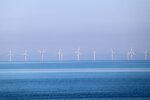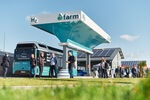12/23/2008
USA - Maine researcher tests new wind turbine design
Building the ideal wind turbine for offshore waters is no simple feat. At the University of Maine's Advanced Engineered Wood Composites Center, researchers are designing, manufacturing and testing windmill blades and towers in search of a solution.
Habib Dagher, director of the center, is working with a number of companies on developing wind turbine technology that is suitable for conditions that are found where waters are hundreds of feet deep, out of sight from land. Out there, waves can swell 40 feet and winds can roar at 80 mph or more.
First, Dagher said, such a wind turbine must be big — a 300-foot tower from the water to the hub of the turbine with blades that are 200 feet long. By comparison, land-based windmills are typically about 240 feet tall with 130-foot blades.
It also must be strong, because of the powerful offshore winds and waves — even the threat of hurricanes. And to cut down on maintenance, it must resist corrosion associated with an ocean environment.
Inside a warehouse testing center, Dagher is overseeing testing of wind blades made of fiberglass, balsa wood and carbon fiber. The balsa makes the blade light, the carbon fiber is stronger than steel, and the lack of metal significantly reduces corrosion.
For the turbine tower, Dagher's research is focusing on composite materials and new manufacturing techniques so they can be built on site — out at sea — eliminating the need to build unwieldy and heavy structures on land and then transport them 20 miles or more offshore.
Testing is centered on inflatable towers that are injected with resin and filled with a low-cost substance like concrete. Similar structures are also being tested for bridge construction.
Deep-water energy farms are years or even a decade or more away, but Dagher is convinced they're an answer to the nation's future energy needs. "What we're looking at are long-term solutions for this country," he said.
Habib Dagher, director of the center, is working with a number of companies on developing wind turbine technology that is suitable for conditions that are found where waters are hundreds of feet deep, out of sight from land. Out there, waves can swell 40 feet and winds can roar at 80 mph or more.
First, Dagher said, such a wind turbine must be big — a 300-foot tower from the water to the hub of the turbine with blades that are 200 feet long. By comparison, land-based windmills are typically about 240 feet tall with 130-foot blades.
It also must be strong, because of the powerful offshore winds and waves — even the threat of hurricanes. And to cut down on maintenance, it must resist corrosion associated with an ocean environment.
Inside a warehouse testing center, Dagher is overseeing testing of wind blades made of fiberglass, balsa wood and carbon fiber. The balsa makes the blade light, the carbon fiber is stronger than steel, and the lack of metal significantly reduces corrosion.
For the turbine tower, Dagher's research is focusing on composite materials and new manufacturing techniques so they can be built on site — out at sea — eliminating the need to build unwieldy and heavy structures on land and then transport them 20 miles or more offshore.
Testing is centered on inflatable towers that are injected with resin and filled with a low-cost substance like concrete. Similar structures are also being tested for bridge construction.
Deep-water energy farms are years or even a decade or more away, but Dagher is convinced they're an answer to the nation's future energy needs. "What we're looking at are long-term solutions for this country," he said.
- Source:
- Online editorial www.windfair.net
- Author:
- Posted by Trevor Sievert, Online Editorial Journalist
- Email:
- ts@windfair.net
- Link:
- www.windfair.net/...
- Keywords:
- wind energy, renewable energy, wind turbine, wind power, wind farm, rotorblade, onshore, offshore


























